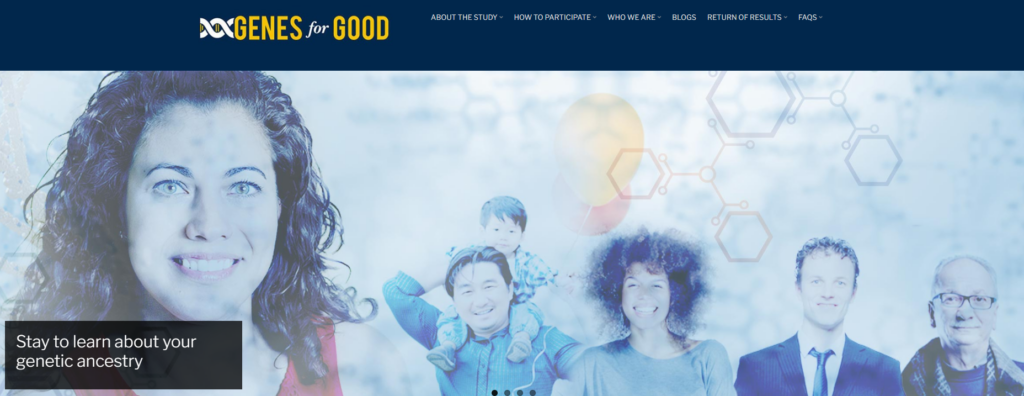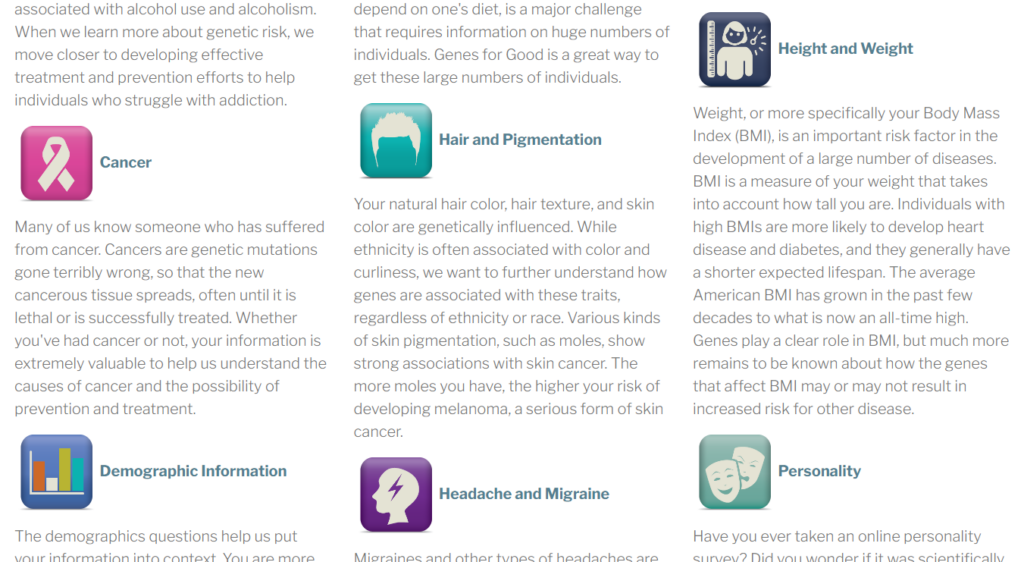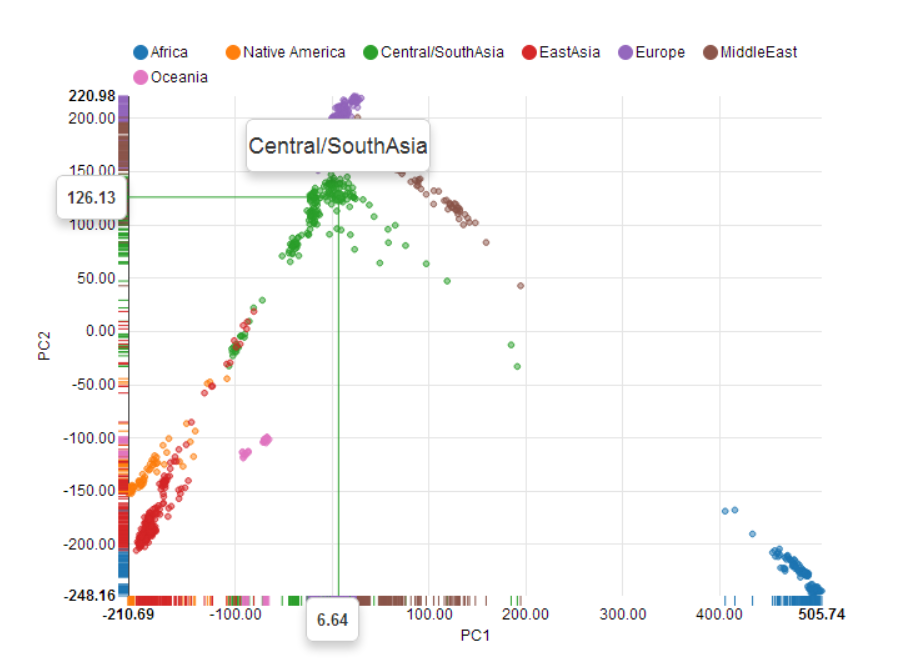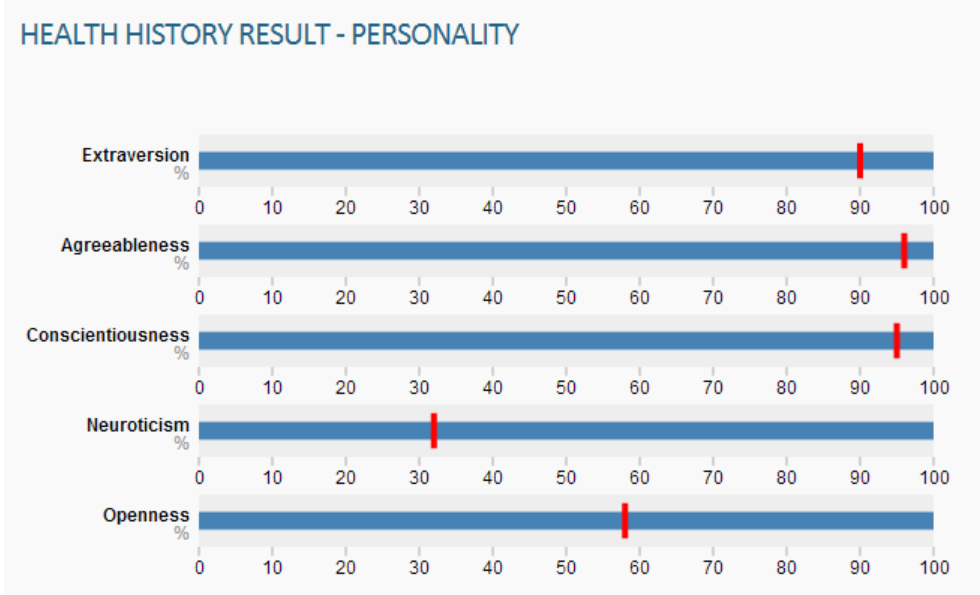7 Facts from our Genes for Good Review
- Location: Ann Arbor, MI
- Products: Genotyping (no longer available) and survey participation
- Cost: $0
- Results: Basic ancestry, personality, and trait information compared to other participants
- Raw data access: Yes
- How it works: Participants meet eligibility requirements by completing surveys. Once eligible, they receive a genotyping kit in the mail
- Alternative Products: Nebula Genomics offers 30X Whole Genome Sequencing that decodes 100% of your DNA and gives reports on diet and much more!
This review is written with the intent to be as unbiased as possible. However, it represents the opinion of an individual reviewer and is therefore subjective. Furthermore, at Nebula Genomics we seek to educate the public about the benefits of Whole Genome Sequencing. Information about our Whole Genome Sequencing DNA test is therefore incorporated into the review.
August 23, 2023
Table of contents
- 7 Facts from our Genes for Good Review
- Pros and Cons
- Introduction
- The Science Behind Genes for Good
- Review of Taking the Gene for Good Tests
- Review of Taking the Gene for Good Surveys
- Review of Genes for Good Results
- Data Access and Interpretation
- Accessing Your Genes for Good Results
- Review of Genes for Good Privacy Policy
- Nebula Genomics
Pros and Cons
Pros
- A valuable contribution to genetic research
- Convenient access to results through the Genes for Good app
- Raw data download
- Potential for future developments and enhancements
Cons
- Study is at capacity
- Much of the raw data is imputed, which have a higher chance for errors
- Limited result distribution options
- Dependence on third-party sites for further exploration of genetic data
Introduction
Genes for Good, an IRB-approved research study at the University of Michigan, aims to engage thousands of individuals in genetic research through genotyping and health survey participation. On the Genes for Good Facebook App, participants contribute their genetic information, answer health-related questions, and explore summaries of survey responses.
The study allows participants to learn about their ancestry and genetics by comparing their DNA to others. They can also download their raw DNA data. By studying the interplay between genes and the environment, this study seeks to enhance understanding of common diseases and improve overall health outcomes.

Gonçalo Abecasis leads Genes for Good as the principal investigator, bringing expertise in genes and common diseases. The team includes Scott Vrieze, Kevin Li, Anita Pandit, Andrew Boughton, Gregory Zajac, Chris Clark, Irene Felicetti, and Stephanie Bachoura. Together, they have engaged over 82,000 participants, completed millions of surveys, and analyzed thousands of genotypes.
Their collaborative efforts are creating an enormous database of genetic and survey information which are intended to provide enhanced insight into common diseases.
The Science Behind Genes for Good
The impact of genes on common and complex diseases cannot be understated. Conditions such as heart disease, cancer, diabetes, migraines, mental illness, and alcohol abuse significantly affect our society. Inherited genes are vital in determining our susceptibility to various diseases and behaviors. For instance, genetic makeup may influence our likelihood of trying cigarettes or developing alcohol addiction.
However, genes do not act alone. The interplay between genetic composition and environment is crucial in understanding disease development. PKU (phenylketonuria) is a prime example of how genes and the environment interact to result in disease. While a genetic mutation is necessary, phenylalanine, which naturally exists in many foods, is also required for the disease to manifest.
Numerous other diseases follow a similar pattern, with multiple genes and environmental factors influencing disease susceptibility. Genes for Good plays a vital role in unraveling this complex interplay that affects the health of billions of individuals.
The research conducted through Genes for Good revolves around generating and analyzing an extensive health and genetic information database to shed light on the underlying causes of common diseases. The vast number of study participants, including over 27,000 genotypes analyzed and close to 3 million surveys completed demonstrate the scale and ambition of this research endeavor.
Genes for Good not only serves as a platform for research but also offers participants the opportunity to learn about their genetic ancestry, health, behavior, and how they compare to other study participants.
Review of Taking the Gene for Good Tests
Due to high interest, the genotyping part of this study is at capacity and the project is unable to send out more genotyping tests. The information in this section is for historical purposes only.
Interested participants should ensure that they meet the eligibility criteria for the study. This includes taking a minimum number of survyes. Once this is complete, the project automatically mails the kit. Once the participants provide a saliva sample as instructed in the kit, they mail it to the Genes for Good team using the provided return envelope.
The team will validate the sample to ensure it meets the required criteria and perform DNA extraction and genotyping in a research laboratory. Results typically take four months to process.
Review of Taking the Gene for Good Surveys
Even though the project no longer sends spit kits, current participants can still take health surveys. These surveys focus on lifelong health and will ask questions about things like whether participants have been diagnosed with cancer or experienced a heart attack.

The project’s goal is to associated genetic factors with common dieases. The surveys may also cover some non-disease related traits, such as personality. There are currently 23 surveys available.
- Alcohol use
- Diabetes
- Cardiovascular disease
- Cancer
- Hair pigmentation
- Height and weight
- Demographic information
- Headache and migraine
- Personaility
- Tobacco use
- Vision
- Psoriasis
- Hearing
- Fertility
- Mental health
- Reasoning
- Eating habits
- Gastrointestinal conditions
- Arthritis
- Allergies and asthma
- Urban neighborhood
- Laterality
- Patterns
- Fitness tracker (discontinued)
There are also daily tracking surveys, which are designed to be completed daily. They include cold/flu, alcohol, mood, activity, sleep, stress, and weight.
Review of Genes for Good Results
Genes for Good provides two types of results: Health and Genome.
Ancestry
Genes for Good provides participants with an estimated percentage of their DNA from seven major world populations, including Europe, Africa, East Asia, Central/South Asia, West Asia/North Africa, the Americas, and Oceania. While the current database size limits the precision of results, ongoing efforts are being made to enhance the level of detail.

Participants receive a plot of their chromosomes, indicating the most likely ancestral population for each chromosomal segment. Additionally, a plot shows where the principal components of their genotypes fall in relation to the seven significant world populations, providing further insights into their genetic heritage.
The project includes information to help participants interpret these graphs.
Health
Participants can use the app to view their health history as a plot, comparing their answers to others in the study. The project provides the example of personality on their website. Once a participant completes the personality survey, they will receive information and comparison charts focusing on the five major personality aspects and how you relate to others.

Data Access and Interpretation
Raw Data Download
When participants’ results are ready to be viewed, they receive an email notification with a download link and a 6-digit access code. Then, they can securly download the raw genetic data on 500,000 positions through the provided link.
Participants also receive information on an additional 7 million positions created by using imputed genotypes.
An imputed genotype is one created by comparing the measured genotypes to another set of people whose genotypes have already been determined, and filling in the best guesses for the DNA bases that were not measured. Because these genotypes are not measured directly, there is a greater chance of errors.
Participants receive raw data in the “23andMe” and VCF formats. Most, but not all, third-party companies will accept one of these data types. Therefore, participants are encouraged to check ahead of time.
Interpreting Results
Genes for Good does not interpret genotypes as it only has permission to show ancestry information and raw genetic data. Participants can upload their raw genetic data to third-party sites or consult genetic counselors for interpretation. These external platforms can provide additional analysis and insights based on genetic information.
Accessing Your Genes for Good Results
At Genes for Good, they believe that your information is yours, and you should be able to access it whenever you’d like. To ensure this, it currently provides three ways for participants to obtain their study results:
1. Comparative Health Results: It graphically displays some health outcomes compared to other participants.
2. Ancestry Results: If participants provided a saliva sample, it graphs the ancestral information in relation to other participants.
3. Publication in Scientific Journals: As scientists, the research team uses the information provided by participants to understand the genetic causes of health and disease. They communicate their research findings through scientific journals, making them accessible on platforms like PubMed.
Review of Genes for Good Privacy Policy
Regarding privacy and data handling, Genes for Good takes several measures to ensure the security and confidentiality of participants’ information. Firstly, they prioritize data security by not sending results via mail or providing hard copies. Instead, participants receive their ancestry results securely through the Genes for Good app. For those who wish to download their raw genetic data, the use of Dropbox ensures a secure transfer.
The Facebook App is securely housed at the University of Michigan. Even though the App is available through Facebook, Facebook cannot see any participant information. Participant identifying information (name, email, address, and so on) is stored separately from health data in a separate location linked only by a random key.
This research study is covered by a Certificate of Confidentiality from the National Institutes of Health that severly limits the ability of researchers to disclose or use participant information to anyone not involved in the research. The only things that are not covered is when the information is needed in accordance with a federal, state, or local law that requires disclosure, such as to report child abuse.
Information shared with researchers is de-identified.
Participants can withdraw from the study at any time via the Facebook App. The project will keep survey responses but delete the participant name and unique Facebook ID from the database.
It will keep certain demographic information like age, sex, and zip code, and use this limited data for future research. It will also keep the DNA sample, if provided. The project notes that it takes important steps to reduce the risk of a data breach.
Nebula Genomics
Genes for Good and Nebula Genomics take different approaches to genetic testing and research. Genes for Good emphasizes population-based research, collecting genetic data for scientific studies, while Nebula Genomics focuses on direct-to-consumer genetic testing, providing detailed reports to individuals.
Nebula Genomics also believes that the latest genetic technology offers the best advantage to users looking to improve their health. That’s why Nebula provides a comprehensive test highlighting predispositions related to diet, fitness, disease, and much more. With 30x Whole-Genome Sequencing, Nebula sequences 100% of your DNA to get to the root cause of every biological inclination.
The test is incredibly accurate and includes other additions, including ancestry reporting and genome exploration tools. Regularly updated reports ensure that you will not miss the latest genetic research.
Nebula is not a diagnostic test, but the results are of the highest quality and can be used in consultation with health care professionals.
For only $299 or less, customers will get access to their entire genome, allowing them to continue to ask more questions as more research is conducted.
Did you like our Genes for Good review? You can read more reviews on our blog and check out our complete guide to the best DNA test kit and other home tests.
Other companies
For DNA tests that analyze health and traits you may also want to check out:
- 24Genetics (various tests for health, ancestry, sports, skin, pharmacogenomics, WES, and WGS)
- Chronomics (wellness and epigenetic tests)
- DNACode (fitness & nutrition, skin, and ancestry options)
- dnaPower (health and wellness DNA testing for diet, exercise, brain health, and more)
- Dynamic DNA Labs (at home tests for health, ancestry, skin, personality, and more)
- Genebase (genetic tests for lifestyle, health, disease, traits, behavior, and ancestry)
- GenePlanet (European testing company for lifestyle, ancestry, and health)
- HealthCodes DNA (personalized plans for wellness, nutrition, and fitness)
- Mapmygenome (preventative genetics, diagnostics, and Indian ancestry)
- MiaDNA (health, wellness, traits, and fitness for adults and children)
- Muhdo (genetic predispositions and epigenetics)
- myDNA (personalized fitness, diet, and medication plans)
- PerkinElmer Genomics (WES, WGS, newborn screening, and more)
- Toolbox Genomics (various DNA, epigenetics, and health tests)

